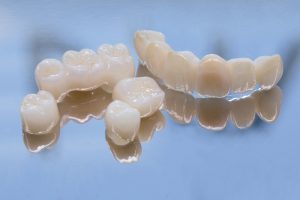Restore Your Smile With Dental Bridges
Losing a tooth can be a difficult experience, affecting both the appearance and functionality of your smile. Fortunately, dental bridges are a popular and effective treatment option for replacing missing teeth. Compared to dental implants, dental bridges involve a different procedure, have varying longevity, and offer a distinct natural appearance. Don’t let your dental health get worse — replace your missing tooth or teeth, at River Birch Dental.
Contact our dentist in Centuria, WI, Dr. Georgie Vargas of River Birch Dental, today by calling our dental office at (715) 646-2161. We’ll schedule your consultation as soon as possible so you can get your oral health back on track.
What Are Dental Bridges?

Different Types of Dental Bridges, Including Implant Supported Bridge
There are several types of dental bridges, including:
- Traditional Dental Bridge: This is the most common type of dental bridge. It consists of one or more artificial teeth anchored to adjacent teeth using dental crowns.
- Cantilever Dental Bridge: This type of bridge is used when only one adjacent natural tooth is available to support the artificial tooth.
- Maryland Dental Bridge: This type of bridge is made of a metal or porcelain framework bonded to the back of supporting teeth. Maryland bridges require a natural tooth on each side of the gap and are typically used to replace front teeth.
Dental Bridge Benefits
When replacing a missing tooth or teeth with a dental bridge, patients may experience the following benefits:
- Restored smile
- Improved functionality
- Maintains facial structure
- Prevents further dental complications
- Long-lasting restoration
- Affordable solution
- Boost in confidence
- Minimally-invasive procedure
- Maintains good oral hygiene to keep remaining teeth strong and healthy, ensuring the longevity of the dental bridge
To schedule your consultation, contact Dr. Snider at River Birch Dental by calling the Phone Number today.
Dental Bridge Procedure

The bridge is cemented, providing a fixed solution for missing teeth. After getting a dental bridge, proper care ensures its longevity so schedule regular dental check-ups and keep a consistent oral hygiene routine at home.
The Costs of a Dental Bridge
While the costs of your dental bridge will vary based on several factors, you can expect to spend between $2,000 and $5,000. Factors that will influence the total cost include:
- Geographical location
- Materials used
- The type of dental bridge (cantilever bridge, implant-supported bridge, traditional fixed bridge, Maryland dental bridge) needed
- Number of teeth that need to be replaced
- Dentist’s expertise and experience
- Dental insurance plan
- Additional procedures
Can You Get a Dental Bridge for Missing Teeth?
Being a candidate for a dental bridge depends on several factors, as there may be possible associated risks. Our dentist will consider the following before recommending a dental bridge procedure:
- Location of Missing Teeth: A dental bridge requires healthy, existing teeth on either side of the gap to serve as abutments (support). If there aren’t stable teeth on either side, a bridge may not be an option.
- The health of Adjacent Teeth: The supporting teeth need to be strong enough to support the bridge. This means they should be free of decay and gum disease, and should have good bone support. If the adjacent teeth are compromised, they might not be suitable as abutments, or they might require treatment first.
- If the bridge needs to be removed due to tooth decay, it may break during the removal process and a new bridge may be required.
- Number of Missing Teeth: Traditional bridges are generally suitable for replacing one to three adjacent missing teeth. If more teeth are missing, or they’re spread out, other options like partial dentures or dental implants might be more appropriate.
- Oral Hygiene: Patients should have good oral hygiene habits or be willing to improve them. A bridge requires meticulous cleaning around and under the false tooth/teeth.
- Gum Health: Patients with untreated gum disease might not be good candidates for a dental bridge until the gum issues are addressed.
- Occlusion (Bite) Considerations: The way the upper and lower teeth come together (the bite) can influence the success of a bridge. If there are significant bite issues, they might need to be addressed either before or in conjunction with a bridge placement.
- Bone Loss: If a tooth has been missing for a long time, there can be significant bone loss in that area. While this doesn’t necessarily preclude someone from getting a bridge, it might make other options like implants more challenging without additional procedures like bone grafting.
If a dental bridge isn’t right for you, our Centuria, WI dentist may recommend other alternatives, such as dental implants or dentures.
Financing Dental Bridges

Transparent Costs & Financing Options
We believe in upfront communication. You’ll receive a personalized treatment plan outlining bridge costs, and we’ll discuss financing options to fit your budget. This includes Wells Fargo financing, CareCredit® with special rates, and our in-house Dental Perks program with low annual fees, treatment discounts, and easy enrollment.
Maximizing Insurance & Additional Options
Our experienced staff can help you understand and maximize your insurance benefits, minimizing out-of-pocket costs. We accept many plans and file claims for you. We also accept traditional payment methods for your convenience.
Let’s Build Your Smile Together!
Contact our office today at (715) 646-2161 to discuss financing options and explore how we can help you achieve a brighter smile.
Frequently Asked Questions
Dental bridges, with proper care and maintenance, can last several years. Their lifespan often ranges from five to 15 years or more. Be sure to visit your dentist twice a year and maintain good oral hygiene to preserve your new bridge.
The cost of a dental bridge can vary depending on various factors, including the type of bridge, materials used, and your location. Consult your dentist’s office for more information about the cost and financing. It’s also advisable to contact your insurance provider for more information about your coverage.
Typically, after a tooth extraction, it’s advisable to wait for about five to six months before getting dental bridges. This duration allows for proper healing of the extraction site, ensuring a more successful and comfortable bridge treatment.
While discomfort during the procedure is possible, modern techniques and anesthetics ensure that patients are kept comfortable throughout the dental bridge process. Afterward, mild discomfort is manageable with prescribed medication and tends to subside quickly.
